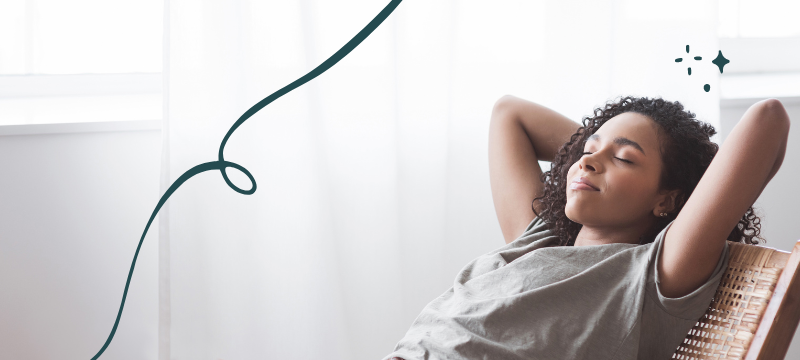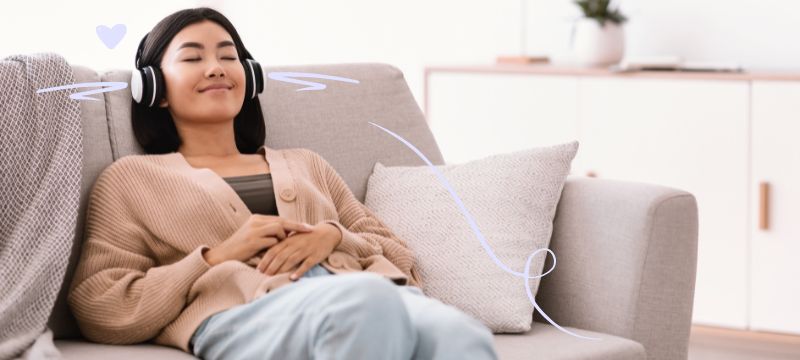11 Unconventional Self-Care Ideas for Sensitive & Stressed Neurodivergents

When you're neurodivergent, sometimes you have to think outside the box for self-care ideas.

Novel self-care for neurodivergents
In the hustle and bustle of our fast-paced world, taking care of ourselves is vital.
Especially for those of us dealing with the ups and downs of being neurodivergent in a neurotypical society.
While regular ritual & restful self-care is cool, sometimes you need something a bit out of the ordinary.
So here are eleven unconventional self-care ideas to help you thrive as a neurodivergent person in an overwhelming world!
1. Increase the font size
Increasing the font size on a phone or computer can reduce visual strain and enhance overall text clarity.
By having a less overwhelming visual environment, a larger font could help:
- maintain focus,
- prevent distractions and
- provide a clearer visual path for processing information.
This can benefit people with dyslexia, ADHD, visual impairments, and sensory processing differences.
2. Turn on closed captions (CC)
Have you ever struggled to hear dialogue or pay attention while watching a movie?
Turning on closed captions could help:
- enhance comprehension by providing a visual aid that reinforces auditory information
- enhance focus by providing a dual sensory input
- reduce sensory overwhelm by allowing you to keep the volume low to minimise loud or unexpected sounds
3. Listen to meditones
Meditones® help you produce calm brainwaves, effortlessly. Meditones are binaural beats combined with beautiful ambient music.
And when you listen with headphones? The meditones effect occurs naturally and easily.
Because meditones help you produce calm brainwaves, you can experience the benefits of meditation. Effortlessly.
![[Illustration of a person wearing headphones listening to Theta meditones at 4 Hz]](https://boyoxtxxygqxqfmqejoz.supabase.co/storage/v1/object/public/blogs/Theta Brain Waves/Restful How Meditones Work - Theta Brain Waves.png)
This makes meditones perfect for sensitive neurodivergent people struggling with sensory overwhelm.
4. Throw away your scale
Do you find yourself weighing your body every day? You may want to consider abandoning your scales.
Constantly monitoring weight can contribute to heightened anxiety and stress and even tend towards obsessive routines.
Instead, try shifting your focus to your overall well-being.
By appreciating your unique strengths, talents, and qualities beyond your physical attributes, you can foster a more positive self-image and a healthier mindset.
5. Take the doors off your cupboards
Do you struggle with object constancy? Or ‘out of sight out of mind’?
You might benefit from using open shelving or even taking the doors off your cupboards.
The enhanced visibility of items can serve as a helpful cue for remembering where things are stored.
Or for easily locating and accessing what you need.
6. Embrace sobriety

Becoming sober can offer various benefits for neurodivergent folk, enhancing both mental and physical well-being.
Substance use can exacerbate mental health challenges.
Conversely, sobriety can positively impact both physical and mental health by:
- having better sleep quality
- reducing symptoms of anxiety & depression
- improving emotional regulation & reducing mood swings
- increased clarity, better focus, and improved executive functions
7. Stop arguing online
Engaging in online arguments can be emotionally draining and stressful. It can even exacerbate depression and anxiety.
If you struggle with mental health, you may benefit from redirecting your online interactions toward more positive and constructive conversations.
This will help you foster a more supportive and uplifting online environment.
You may also find that redirecting your time and energy toward positive pursuits, hobbies, or self-care activities is more beneficial for overall well-being.
8. Create a stimming safe space
Stimming, or self-stimulatory behaviour, is a common way for neurodivergent folk to regulate sensory input.
A safe stimming space provides a controlled and calming environment, reducing the risk of sensory overload.
Plus it provides a judgment-free zone where you can freely express yourself without concerns about social expectations or misunderstandings.
9. Invest in noise-cancelling headphones

Noise-cancelling headphones are one of the best self-care tools a neurodivergent person can have.
These headphones block out or reduce background noises, making the surroundings quieter and more manageable.
This feature can help you:
- maintain focus
- manage overwhelming noise, and
- navigate challenging situations with more comfort.
It’s like a volume knob for the world, giving a sense of control in noisy situations and reducing stress.
10. Use earplugs
Loop earplugs are great for neurodivergent ears because they provide a discreet way to manage sensitivity to noise.
These earplugs are designed to reduce specific frequencies while keeping things clear, and you can adjust them to your liking.
They’re comfortable for long-term use and help regulate the auditory environment, making them a practical tool for dealing with sensory challenges.
11. Hire a carer
Self-care isn’t always something you have to do all by yourself.
A dedicated carer can:
- help with daily tasks
- provide emotional support, and
- assist in navigating challenges related to social interactions or sensory sensitivities.
This personalised care can create a comforting and stress-reducing environment, promoting overall well-being.
There is no shame in needing assistance for self-care.
Takeaway
These unconventional self-care ideas for sensitive and neurodivergent people just go to show the benefits of unique practices.
By investing in tools, environmental adjustments and personalised strategies?
And by addressing your unique challenges and fostering a compassionate approach to daily living?
You can create comfort, reduce stress, and improve your overall quality of life.
Soothe stress effortlessly with the Restful app. Download for free on Google Play or the App Store today!